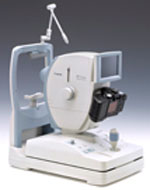
Canon Europe, leader in imaging solutions, has launched the CR-1 Mark II digital non-mydriatic retinal camera for medical institutions in Europe. Used with Canon’s 15.1-megapixel EOS 50D digital SLR camera, the new Canon CR-1 Mark II employs sophisticated noise-reduction technology to provide high-quality retinal image capture, with one quarter the flash light intensity of Canon’s previous retinal diagnostic system.
The retina is the only place in the human body where blood vessels can be directly observed. Retinal imaging supports the early detection of glaucoma and other ocular disorders, as well as conditions such as hypertension and diabetes.
Medical institutions demand retinal diagnostic systems that enable both high image quality and fast throughput for shorter and more efficient examinations. The Canon CR-1 Mark II addresses these requirements and also responds to patients’ desire for a retinal camera that reduces uncomfortably high flash intensity.
The CR-1 Mark II minimises pupil dilation so that examinations which involve taking multiple pictures, such as binocular and stereo images, and recapturing images can be performed in less time than previously required.
The CR-1 Mark II comes with the Retinal Imaging Control Software suite (RICS). This has a range of tools that enable the operator to investigate images immediately after they are captured, allowing them to view the image in great detail. The operator can also adjust the picture’s qualities including brightness and colour separation during the examination, for faster diagnosis.
Post-examination, the images can be stored on any device with easy connectivity to hardware such as printers and PCs. This makes accurate record-keeping simpler and provides faster access to case files for comparison.
The Canon CR-1 Mark II will be on display at ESCRS Congress in Barcelona, Spain, 12-16 Sept 2009, booth number H2.
Canon has been an innovator in Medical applications for 68 years. Today Canon's extensive line of ophthalmic diagnostic equipment spans cutting-edge digital retinal imaging systems, fully automatic Ref-Keratometers and Tonometers, as well as associated intuitive control software to enhance patient care. Canon's advanced diagnostic cameras expand the limits of retinal photography and improve the quality of vision care.
















